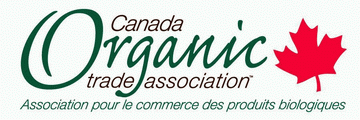
Media Releases from members of Sources.
To submit a news release, use this form.
To submit a news release, use this form.

GE-contaminated flax seed raises concerns for Canadian organic sector
September 11, 2009
SACKVILLE, NB — The Organic Trade Association (OTA) in Canada has called the recent discovery of contaminated flax seed in Europe "unacceptable," and said biotechnology companies must take responsibility for damages caused by their lack of appropriate containment protocols.The European Commission′s Rapid Alert System for Food and Feed has discovered an illegal genetically engineered (GE) trait in German food products, which originated from Canada. Although no organic products have been implicated at this time, the discovery of this unauthorized GE trait in food products is a major concern for the Canadian organic sector, and for consumers around the world. The GE flax in question, called `Triffid,′ was designed specifically to withstand applications of synthetic chemical pesticides.
"It′s time for biotech companies to be good parents and take responsibility for their children. The owners of GE crops need to assume the liability for loss of market access due to their technologies appearing in countries or products in which they are not wanted. As GE products are not permitted under organic standards, the organic sector in Canada is extremely concerned by the prospect of losing access to its essential markets in Europe, Asia and around the world," said Matthew Holmes, managing director of OTA in Canada.
The controversial illegal contamination of flax comes on the heals of recent activity to fast-track new GE crops into North America, including GE sugar beets, the July approval of Monsanto and Dow′s "SmartStax" GE corn, and current proposals to allow GE alfalfa and GE wheat to be grown in Canada.
"The introduction of GE alfalfa will seriously compromise Canada′s agricultural sector, and if GE wheat `goes wild′ like this flax seems to, it could destroy the market for Canada′s most important export commodity, wheat, whether it′s organic or not," Holmes said.
An article in the Summer 2009 edition of The Organic Report indicates that the proposed introduction of GE alfalfa in Canada will seriously compromise the marketability of organic and non-organic crops for domestic and international markets. Alfalfa is a foundation of organic agriculture: used in crop rotations and as a green nutrient for soil to reduce reliance on monoculture and chemical fertilizers.
The Organic Trade Association has repeatedly called for a moratorium on new GE crops introduced into North American markets until more research is done on the impact of these technologies on human health, the environment and the economic impact of their introduction.
Founded nearly 25 years ago, the Organic Trade Association (OTA) is the membership-based business association for organic agriculture and products in North America, with affiliated offices in Canada and the United States. Its members include growers, shippers, processors, certifiers, farmers' associations, distributors, importers, exporters, consultants, retailers and others. OTA′s mission is to promote and protect the growth of organic trade to benefit the environment, farmers, the public and the economy. www.ota-canada.ca
For more information contact:
Matthew Holmes
managing director
Organic Trade Association in Canada
Phone: 613-482-1717
Cell: 506-260-7537
Email: mholmes@ota.com
Website: www.ota-canada.ca
Click here to view our Sources Listing
Topics:
- Agricultural Associations
- Agricultural Industries
- Agricultural Management
- Agricultural Policy & Regulation
- Agricultural Produce
- Agricultural Waste & Water Pollution
- Agriculture/Ecology
- Agriculture/Food Policy
- Agriculture Statistics
- Agriculture/Trade Policy
- Agrifood
- Animal Health & Welfare
- Biodiversity
- Bio-pesticides
- Business Associations
- Canada-U.S. Trade
- Environment
- Environmental Pest Management
- Farm Policy
- Farming/Farm Economy
- Farming Practices
- Food Additives/Inspection
- Food & Beverage Industry
- Food Inspection
- Food Safety
- Genetically Engineered Foods
- Genetically Modified Organisms (GMOs)
- Inspection/Food & Animals
- Nutrition
- Organic Agriculture/Food
- Organic Farming
- Organic Foods
- Organic Horticulture/Gardening
- Organic Practices
- Pesticides
- Standards & Certification
- Sustainable Agriculture
- Sustainable Development
- Trade & the Environment
- Trade Issues
| Information and Media Resources from Sources | |||||||||
| Main News Release page | Media releases from clients of the Sources media relations service. | ||||||||
| Sources Calendar | Check out newsworthy events from across Canada. | ||||||||
| Sources Directory | Search the Sources directory of experts, contacts and media spokespersons. Find how to include yourself in Sources. | ||||||||
| Publish your news releases | Sources can help you distribute your media releases | ||||||||
| Media Names & Numbers | Directory of Canada's print and broadcast media. | ||||||||
| Parliamentary Names & Numbers | Full contact information for government, political parties, lobbyists, and embassies. | ||||||||
